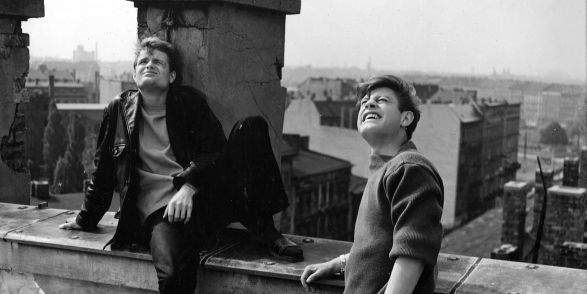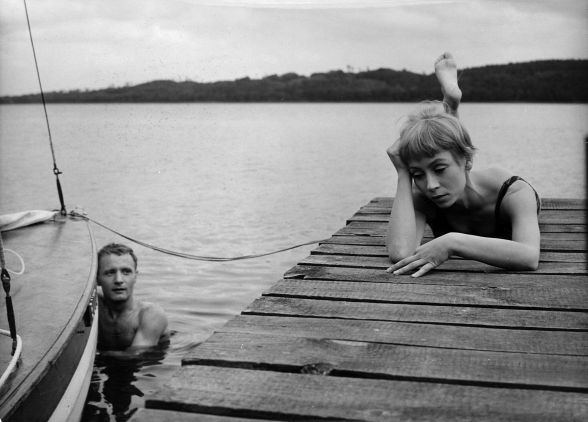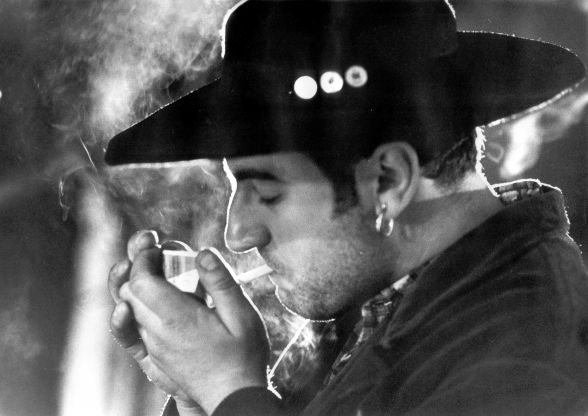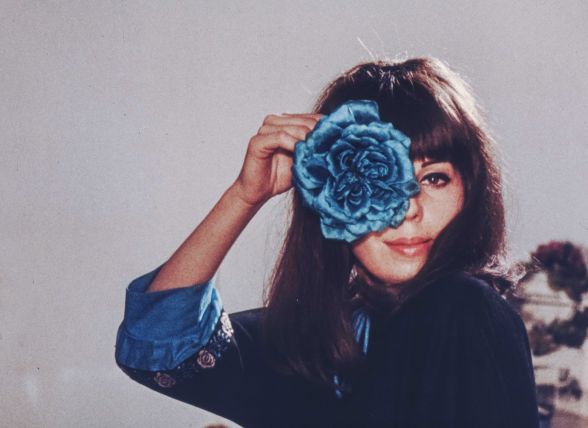
Dieter Mann and Kaspar Eichel in ‘Berlin, um die Ecke’, GDR, 1965-66/1987 and 1990, directed by Gerhard Klein
© DEFA-Stiftung/Heinz Wenzel
Germany 1966 – Redefining Cinema

Nina Stepun, Helmut Förnbacher and Christian Doermer in ‘Schonzeit für Füchse’, FRG, 1965/1966, directed by Peter Schamoni
© Schamoni Film, source: Deutsche Kinemathek
Retrospective 2016
The Retrospective of the 66th Berlin International Film Festival is dedicated to the year 1966, a turning point in German cinema dating back fifty years. An atmosphere of change prevails: in the West, auteur filmmakers challenge the contradictions of the economic miracle, in the East, young directors question everyday life under socialism. The New German Cinema manages to make an international breakthrough, whereas in East Germany, as a result of the 11th plenum of the Central Committee of the Socialist Unity Party (SED) in December 1965, almost half of all DEFA feature films intended for theatrical release in 1966, are banned. With that abrupt end to concurrent developments, opportunities for mutual appreciation were also lost. The Retrospective aims to counter that with its overview of films from both sides. The Retrospective includes around 20 East and West German feature and documentary films from cinema and television. Additionally, more than 30 films of short and medium length – a typical format at the time – will feature in film programs and as supporting films.

Jürgen Hentsch and Jutta Hoffmann in ‘Karla’, GDR, 1965-1966/1990, directed by Herrmann Zschoche
© DEFA-Stiftung/Eberhard Daßdorf
West and East
Four years after the authors of the Oberhausen Manifesto proclaimed “the old film is dead. We believe in the new one”, the New German Cinema for the first time receives critical acclaim at important film festivals: The Berlinale awards Peter Schamoni’s debut ‘Schonzeit für Füchse’ (‘No Shooting Time for Foxes’, FRG, 1966) with a Silver Bear, Volker Schlöndorff’s film ‘Der junge Törless’ (‘Young Törless’, FRG/F, 1966) receives the film critics prize in Cannes, while Alexander Kluge’s ‘Abschied von Gestern’ (‘Yesterday Girl’, FRG, 1966) wins the Silver Lion in Venice. ‘Es’ (FG, 1966, directed by Ulrich Schamoni) won four golds and one silver award at the Deutscher Filmpreis (German Film Prize), the best known honors in the German film industry.
By contrast, DEFA productions that openly question the contradictions of so-called “real existing socialism”, are banned and in most cases premiere only years or even decades later. Two of such ‘forbidden films’, Hermann Zschoche’s ‘Karla’ (‘Carla’, GDR, 1965/1990), and Jürgen Böttcher’s ‘Jahrgang 45’ (‘Born in ’45’, GDR, 1966/1990) will be shown at the Retrospective. Presenting these films in their censored versions, as they were when they were aborted, as well as how they were eventually released in 1990, will reveal the discrepancy between the two. A short documentary by Kurt Tetzlaff will also be shown in two versions: ‘Es genügt nicht 18 zu sein’ (censored version: ‘Guten Tag – das sind wir’, both GDR, 1966).

Manfred Krug in ‘Spur der Steine’, GDR, 1965/1966, directed by Frank Beyer
© DEFA-Stiftung/Klaus D. Schwarz
Drifters, rebels, searchers
But as different as conditions may have been, the auteur films from the West and the studio productions from the East have much in common. The protagonists are drifters, rebels or searchers. Like the dockworker, who roams the streets of Hamburg on a sleepless night (‘Jimmy Orpheus’, FRG, 1966). Or the rebellious brigadier Balla in ‘Spur der Steine’ (‘Trace of Stones’, GDR, 1966, directed by Frank Beyer), a film that ran in the cinemas for only three days before it too was banned. Or Helene Raupe in ‘Fräulein Schmetterling’ (‘Miss Butterfly’, GDR 1965/FRG 2005, directed by Kurt Barthel), who longs for self-realisation. The film was censored and never completed. Using an experimental form, it contrasts Helene’s unadorned day-to-day life and her professional defeats with her fantasy world.

May Spils in ‘Das Portrait’, FRG, 1966, Regie: May Spils
© M. Spils, Quelle: Deutsche Kinemathek
Female characters and female directors
For most of the female protagonists of the DEFA films, it is normal to have a career, not so in the West. Along with contraception, abortion and adultery, these are issues that are openly addressed by female protagonists in ‘Playgirl’ (FRG, 1966, directed by Will Tremper) and ‘Mahlzeiten’ (‘Lust for Love’, FRG, 1967, directed by Edgar Reitz). From 1966, the founding of the German Film and Television Academy Berlin (DFFB) as well as other film schools, leads to a professionalisation of film education in West Germany. As a consequence, young women directors, who will go on to shape German cinema, make their mark with their first works. “It was important to us to include early short films by directors such as Jeanine Meerapfel, May Spils, Helke Sander, Ula Stöckl and the DEFA documentarian Gitta Nickel in our program”, says Rainer Rother, Head of the Retrospective and Artistic Director of the Deutsche Kinemathek.